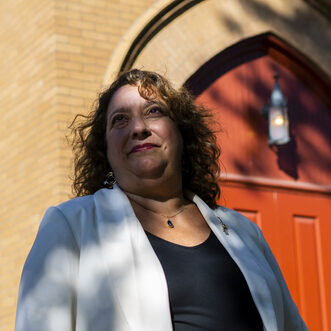Although not halakhically required, the practice among Jews for many centuries has been for men (and with growing numbers, women and people of all genders) to keep their heads covered during specific times out of a sense of reverence for God.
There have also always been Jews who have kept their heads covered at all times.
Within the Conservative Jewish world, there are those who wear a hat (usually a skullcap called a kippah or yarmulke) at all times, and there are those who limit their wearing of a kippah to spiritually charged moments.
There is a wide range of specific customs related to the issue of covering the head, including what to cover it with.
A kippah is common, but a hat or thick headband can also serve this purpose.
The central and most widely observed spaces to cover one’s head are in the sanctuary of a synagogue, engaged in prayer or Jewish study, performing a mitzvah, and eating. There are also those who cover their heads when entering a synagogue building for any reason at all.
Wearing a kippah is a tradition sanctified by long generations of practice, not an actual mitzvah of the Torah.
There is no blessing to recite when donning a kippah analogous to the one recited when donning the tallit. Nonetheless, many Jews today feel that the tradition has acquired quasi-legal status and should therefore be treated as an unofficial mitzvah.
Within the Conservative movement, the Solomon Schechter schools, Camp Ramah, and the United Synagogue Youth movement all mandate the wearing of a kippah or other head covering during ritual activity including prayer.
Doing so instills reverence for God and strengthens one’s sense of connectedness to the Jewish people.
Adapted with permission from The Observant Life.
Authors
-

Rabbi Dr. Karen G Reiss Medwed, is Teaching Professor emerita at Northeastern University. She serves as Interim Vice Provost, Academic Affairs and Initiatives for HUC-JIR. Dr. Reiss Medwed's scholarship includes digital education, higher education leadership, and faith-based education. Dr. Reiss Medwed was ordained by JTS in 1995, and earned her Ph.D. from New York University's Steinhardt School of Education in Curriculum, Teaching and Learning with a specialization in Jewish education in 2005.
View all posts -

The Observant Life: The Wisdom of Conservative Judaism for Contemporary Jews distills a century of thoughtful inquiry into the most profound of all Jewish questions: how to suffuse life with timeless values, how to remain loyal to the covenant that binds the Jewish people and the God of Israel, and how to embrace the law while retaining an abiding sense of fidelity to one’s own moral path in life. Written in a multiplicity of voices inspired by a common vision, the authors of The Observant Life explain what it means in the ultimate sense to live a Jewish life, and to live it honestly, morally, and purposefully. The work is a comprehensive guide to life in the 21st Century. Chapters on Jewish rituals including prayer, holiday, life cycle events and Jewish ethics such as citizenship, slander, taxes, wills, the courts, the work place and so much more.
View all posts







